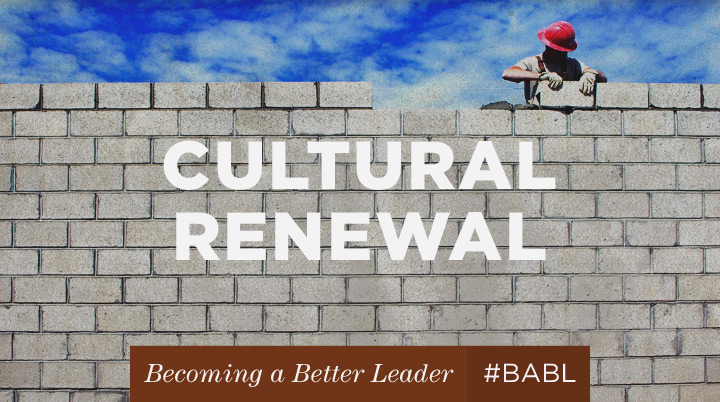Latest
-
Objections to the Christian Faith from the Unchurched and De-Churched
 Tue Dec 02, 2014
Tue Dec 02, 2014
by Resurgence -
Craig Groeschel: We Innovate for Jesus
 Tue Oct 14, 2014
Tue Oct 14, 2014
by Resurgence -
Mark Driscoll: Revelation
 Tue Oct 07, 2014
Tue Oct 07, 2014
by Resurgence -
RESURGENCE LEADERSHIP #034: JOHN PIPER, WHY I TRUST THE SCRIPTURES, PART 2
 Tue Sep 30, 2014
Tue Sep 30, 2014
by Resurgence -
Resurgence Leadership #033: John Piper, Why I Trust the Scriptures, Part 1
 Tue Sep 23, 2014
Tue Sep 23, 2014
by Resurgence

Archives
Cultural renewal

In his last post, “Your work matters to God,” Hugh Whelchel said, “If we are serious about the truth of Christianity, we need to engage in cultural renewal.” Today he follows up with this statement and provides some practical steps in how we can engage in cultural renewal through our vocation.
How do we engage in cultural renewal?
It’s a big question that many Christians are asking. And as more and more faithful Christians rediscover the biblical doctrine of work and its implications for their lives, they can’t help but wonder what it looks like to change the culture in which they live.
As you dive deeper into the biblical doctrine of work, you’ll find one tool that, almost more than any other, can help you engage in cultural renewal: your vocation.
Your vocation is one of the most powerful means God provides for you to shape and influence culture.
We must learn how to use the gifts God has given us, particularly in our vocations, to be salt and light at every available opportunity. We have the opportunity to transform our communities, our nation, and the world, in service to the glory of God.
Christians have struggled with applying the concept of vocation to their lives. As Tim Keller notes,
We do not know how to equip our people to think out the implications of the gospel for art, business, government, journalism, entertainment, or scholarship.
The separation of faith and calling by Christians, along with the loss of the biblical doctrine of work, has had a devastating effect on the landscape of American culture. But this can change.
Theologian John Frame writes,
As God’s spirit penetrates people’s hearts through the gospel, those people become new creatures. They take their faith into every sphere of life, including the workplace, politics, economics, education, and the arts. And in all those realms, they seek to glorify God . . . their incipient obedience leads to significant change in society.
What steps must we take to bring about such change through our vocations?
We must first rediscover that our primary vocation is the call to follow Jesus. From this primary call flows our call to our churches, our families, our communities, and to our economic work. All of life is to be lived under the complete lordship of Christ.
After answering this primary call, we must:
- Learn how to think out the implications of the Christian view of reality for our professions. Our theology of work should teach us how to think about life—public and private.
- Employ good stewardship by using all our gifts to serve the Lord and others at every opportunity.
- Labor as though Jesus himself is the one we must ultimately please (Col. 3:17). We must work diligently, striving to excel more and more.
Vocation is a part of life through which we express Christian discipleship.
Richard Doster offers a vision of the impact pursuing our vocations can have on culture. He uses the call to business as an example when he writes,
God’s people can, as agents of his redemptive plan, transform business, stripping it of selfish ambition and pursuing instead what’s best for their neighbors. Through business, God’s people can harness mankind’s creativity, and with it nurture his creation, developing products that make the world more satisfying. Through the economic power of commerce, Christians can make the world safer and healthier. The members of Christ’s church, distributed in offices around the world, can transform greed into good stewardship, showing the world that business has a biblical responsibility to create new wealth and provide a fair return to investors (Matt. 25:14–28). But, with an eye toward the consummation of Christ’s kingdom, we also create wealth in order to create new and satisfying jobs, which offer the hope (and perhaps a glimpse) of a coming world where there is no poverty.”
Motivated by the cultural mandate and inspired by the power of the gospel of Jesus Christ, through our vocations, we have the opportunity to transform our communities, our nation, and the world. Our effectiveness will provide a catalyst for sustained cultural renewal.